
Folklore-Electronic Journal of Folklore
Scope & Guideline
Bridging Cultures with Rigorous Research
Introduction
Aims and Scopes
- Interdisciplinary Approaches to Folklore:
The journal emphasizes research that integrates various disciplines such as anthropology, sociology, history, and cultural studies to provide a comprehensive understanding of folklore phenomena. - Cultural Identity and Tradition:
A core area of focus is the exploration of cultural identity through traditional practices, music, and narratives, particularly in relation to how these elements shape community and individual identities. - Folklore in Contemporary Contexts:
The journal investigates how folklore adapts and transforms in modern settings, including the impact of technology, globalization, and social movements on traditional practices. - Rituals and Beliefs:
A significant theme is the study of rituals, beliefs, and their implications in various cultural settings, particularly in the context of changing societal norms and crises. - Gender and Folklore:
The journal also addresses the role of gender in folklore, exploring representations, narratives, and the participation of different genders in folk practices. - Archival Research and Preservation:
The importance of preserving folklore archives and the methodologies involved in collecting, analyzing, and interpreting folklore materials is a recurring theme.
Trending and Emerging
- Crisis and Folklore:
There is an increasing focus on how folklore serves as a coping mechanism during crises, such as the COVID-19 pandemic, showcasing the role of humor, narratives, and rituals in community resilience. - Digital Folklore:
Research on digital folklore, including memes, online narratives, and social media's role in shaping contemporary folklore, is gaining traction as technology continues to influence cultural expressions. - Trauma and Memory:
An emerging theme is the exploration of trauma narratives within folklore, particularly how personal and collective traumas are expressed and processed through storytelling and cultural practices. - Gender Studies in Folklore:
There is a growing interest in examining gender roles within folklore, analyzing how traditional narratives and practices reflect and shape gender dynamics in society. - Participatory Folklore Practices:
The journal is increasingly publishing works that explore participatory and community-based folklore practices, emphasizing the active role of individuals in creating and maintaining cultural traditions.
Declining or Waning
- Historical Folklore Studies:
There has been a noticeable decrease in papers focusing solely on historical folklore without contemporary relevance, as scholars increasingly seek to connect past traditions with present-day issues. - Traditional Performative Arts:
Research on traditional performative arts, such as folk dances or theater, appears to be waning, possibly due to a shift towards more analytical and theoretical approaches to folklore. - Solely Regional Studies:
Papers focused exclusively on regional folklore without broader cultural or thematic connections seem to be less frequent, indicating a trend towards more comparative and global perspectives. - Mythological Studies:
The exploration of mythological narratives in isolation has decreased, suggesting a preference for studies that incorporate myth within broader cultural or social frameworks. - Folklore and Natural History:
The intersection of folklore with natural history, such as studies on flora and fauna in folklore, has seen a decline, possibly overshadowed by more pressing contemporary themes.
Similar Journals
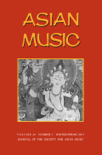
ASIAN MUSIC
Fostering Interdisciplinary Insights into Asian Music.ASIAN MUSIC is a distinguished academic journal published by University of Texas Press, focusing on the rich and diverse musical traditions of Asia. With an ISSN of 0044-9202 and an E-ISSN of 1553-5630, this journal serves as a key platform for interdisciplinary research that encompasses musicology, ethnomusicology, and cultural studies related to Asian music practices. While ASIAN MUSIC is not an open-access journal, it provides valuable insights and scholarly articles that contribute significantly to the understanding of music’s role within Asian cultures. The journal originally covered works from 2002 to 2010 and has a reputation for fostering discussions that celebrate the intricacies of sound, performance, and society. Targeting researchers, professionals, and students alike, ASIAN MUSIC stands as a crucial resource for those engaged in the study of music in its multifaceted context.
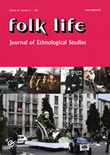
Folk Life-Journal of Ethnological Studies
Celebrating Cultural Diversity through Rigorous Scholarship.Welcome to the Folk Life-Journal of Ethnological Studies, a distinguished publication devoted to exploring the rich tapestry of human culture and ethnological research. Published by Routledge Journals, Taylor & Francis Ltd, this journal serves as an essential platform for scholars and practitioners within the fields of Anthropology, Arts and Humanities, and Cultural Studies. With a publication history stretching back to 1963, the journal has become a valuable resource for disseminating innovative and interdisciplinary research, contributing to a deeper understanding of diverse cultural phenomena. Despite its current quartile rankings of Q4 across multiple categories, 'Folk Life' continues to strive for academic excellence and encourages submissions that challenge existing narratives and offer fresh perspectives. Although not open access, articles published in this journal are rigorously peer-reviewed, ensuring the highest scholarly standards. Researchers, professionals, and students alike will find rigorous and thought-provoking studies within its pages, making Folk Life an important fixture in the academic landscape.

OSTERREICHISCHE ZEITSCHRIFT FUR VOLKSKUNDE
Advancing the Study of Social Practices and TraditionsOSTERREICHISCHE ZEITSCHRIFT FUR VOLKSKUNDE is a dedicated academic journal published by the VEREIN FUR VOLKSKUNDE that focuses on the interdisciplinary study of folklore and ethnology, particularly in the Austrian context. With a long-standing history of contributing to cultural studies, this journal serves as an essential resource for researchers, professionals, and students interested in the nuances of social practices, traditions, and cultural narratives. Although it has ceased its indexing in Scopus as of 2019, its impact is reflected in its rankings, particularly in the categories of Social Sciences and Arts and Humanities, making it a crucial reference point for those studying cultural phenomena. The journal, with ISSN 0029-9669, is based in Vienna, Austria, and offers a rich compendium of articles that promote scholarly discourse and broaden understanding in the field of Volkskunde. As it continues to foster academic dialogue, OSTERREICHISCHE ZEITSCHRIFT FUR VOLKSKUNDE remains a notable contributor to the evolution of cultural studies in the region and beyond.
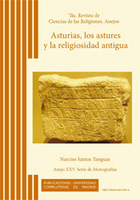
Ilu-Revista de Ciencias de las Religiones
Bridging Disciplines to Illuminate Spiritual PhenomenaIlu-Revista de Ciencias de las Religiones is a distinguished academic journal published by UNIV COMPLUTENSE MADRID, SERVICIO PUBLICACIONES, focusing on the interdisciplinary examination of religion through the lenses of both Philosophy and Religious Studies. With an ISSN of 1135-4712 and an E-ISSN of 1988-3269, this journal has established itself as a valuable resource within its field, evidenced by its consistent presence in Scopus rankings. In 2023, it holds a Q3 quartile rank in both Philosophy and Religious Studies, providing a platform for the dissemination of significant scholarly work. The journal aims to facilitate rigorous academic discussion and promote research that explores the complexities of religion in contemporary society. Although it operates under traditional access guidelines, its relevance is underscored by the range of topics covered, appealing to researchers, professionals, and students eager to deepen their understanding of religious phenomena. With a commitment to enhancing interdisciplinary dialogue, Ilu invites contributions that offer innovative insights and foster intellectual inquiry among diverse audiences.
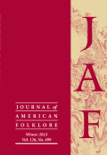
JOURNAL OF AMERICAN FOLKLORE
Celebrating Tradition through Scholarly InsightJOURNAL OF AMERICAN FOLKLORE, published by the American Folklore Society, is a distinguished journal dedicated to the exploration and analysis of folklore, cultural traditions, and the diverse narratives that shape American identity. With a rich history dating back to its inception, the journal has positioned itself as a leading platform in the field, boasting a 2023 ranking of Q1 in Cultural Studies and Q2 in Arts and Humanities (miscellaneous). The journal's impact within the academic community is underscored by its high Scopus rankings, placing it in the 83rd and 65th percentiles in Cultural Studies and Arts and Humanities, respectively. Readers can access a wealth of insightful articles that contribute to ongoing discussions in folklore studies, cultural anthropology, and related disciplines. As the study of folklore becomes increasingly relevant in understanding contemporary societal dynamics, JOURNAL OF AMERICAN FOLKLORE serves as an essential resource for researchers, professionals, and students alike, enriching discourse and fostering a deeper appreciation for the cultural experiences that define America.

SLAVIC AND EAST EUROPEAN JOURNAL
Illuminating the Diversity of Eastern European NarrativesThe Slavic and East European Journal (ISSN: 0037-6752) is a distinguished publication focused on the rich tapestry of Slavic and Eastern European cultures, languages, and literatures. Published by the Ohio State University’s Department of Slavic and East European Languages & Culture, this journal serves as a vital platform for scholars and researchers keen on exploring linguistic diversity and cultural heritage in these regions. With a wide-ranging scope, the journal addresses significant topics within Cultural Studies, Linguistics, and Literature, currently categorized in Q4 and Q3 quartiles across various academic metrics. Although it does not offer open access, anticipation is high among academics seeking to contribute or access cutting-edge research that pushes the boundaries of understanding these complex fields. As it converges from 2009 to 2024, the Slavic and East European Journal continues to uphold its commitment to academic excellence and community engagement, making it an essential resource for anyone dedicated to the study of Slavic and Eastern European traditions.

Slavia-Casopis pro Slovanskou Filologii
Connecting Cultures through Slavic Language and LiteratureSlavia-Casopis pro Slovanskou Filologii is an esteemed journal dedicated to the advancement of Slavic philology, published by the SLOVANSKY USTAV AKAD CESKE REPUBLIKY in the heart of the Czech Republic. With its ISSN: 0037-6736, the journal serves as a vital platform for scholarly exchange, embracing a rich academic tradition since its convergence years beginning in 2002. The journal has achieved notable recognition, with a Q3 ranking in Linguistics and Language and a Q2 in Literature and Literary Theory as of 2023, highlighting its contribution to these dynamic fields. Although it does not currently offer open access, its rigorous selection of articles ensures that it remains a crucial resource for researchers and practitioners alike, facilitating a deeper understanding of Slavic languages and literature. Scholars benefit from the journal's extensive research backdrop, enhanced by its current ranks in the Scopus database, underscoring its significant placement within the academic literature landscape. The editorial scope of Slavia promotes innovative inquiries that reflect cultural, historical, and theoretical perspectives endemic to Slavic studies, making it indispensable for professionals, students, and enthusiasts invested in the exploration of Slavic linguistic and literary heritage.
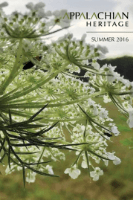
Appalachian Heritage-A Literary Quarterly of the Southern Appalachians
Celebrating the Soul of Southern AppalachiaAppalachian Heritage is a distinguished literary quarterly dedicated to exploring the rich cultural tapestry of the Southern Appalachians, published by the University of North Carolina Press. With a focus on literature, folklore, and the arts, this journal serves as a vital platform for scholars, writers, and enthusiasts alike. Through its thoughtfully curated content, Appalachian Heritage not only celebrates the unique voices and stories of this region but also contributes to a broader understanding of Appalachian identity within the greater context of American literature. While the journal operates under traditional access models, its editorial commitment to quality and cultural relevance ensures that it remains an essential resource for those seeking to delve into the literary heritage of the Southern Appalachians. The journal features a blend of academic articles, creative works, and critical essays that engage with themes of place, memory, and community, making it a must-read for anyone invested in the intersection of literature and culture.

Novyi Filologicheskii Vestnik-New Philological Bulletin
Advancing Knowledge in Linguistics and Literary StudiesNovyi Filologicheskii Vestnik-New Philological Bulletin is a distinguished academic journal published by the Russian State University for the Humanities, devoted to the interdisciplinary study of linguistics, literature, and philology. With its ISSN 2072-9316, this journal serves as an essential platform for scholars, researchers, and students aiming to explore the depths of philological research and its applications. Although currently operating under a traditional access model, the journal emphasizes accessibility and engagement with advancements in linguistic theory and literary analysis, reflecting the evolving landscape of philological studies. The bulletin is dedicated to fostering academic discourse by publishing original research, critical essays, and comprehensive reviews, thereby contributing significantly to the advancement of knowledge and understanding in the field. Set in the heart of Moscow, the journal aims to bridge local and global scholarship, inviting contributions that showcase innovative methodologies and theoretical frameworks. Overall, Novyi Filologicheskii Vestnik-New Philological Bulletin stands as a vital resource for anyone interested in contemporary developments in philology and related disciplines.

Annales-Anali za Istrske in Mediteranske Studije-Series Historia et Sociologia
Advancing Interdisciplinary Insights in History and SociologyAnnales-Anali za Istrske in Mediteranske Studije-Series Historia et Sociologia, published by the Historical Society Southern Primorska Koper (HSSP), is a premier scholarly journal dedicated to the exploration of historical and sociological perspectives in the context of Istria and the broader Mediterranean region. Operating since 2011, this Open Access journal has made significant strides in the academic community, achieving a prestigious Q1 ranking in History and a Q2 ranking in Social Sciences (miscellaneous) as of 2023. It holds an impressive position within Scopus, ranking #316 out of 1760 in Arts and Humanities History and #163 out of 275 in General Social Sciences, highlighting its impact and relevance. With a commitment to fostering interdisciplinary dialogue, the journal invites researchers, professionals, and students to contribute to its rich discourse. By providing a platform that values high-quality research, the journal aims to enhance understanding of the complexities of historical and sociological dynamics in the Mediterranean, ensuring access to knowledge that is both comprehensive and insightful. Its accessible format reflects the contemporary emphasis on democratizing research output, catering to a global audience eager to engage with critical themes in historical and social sciences.